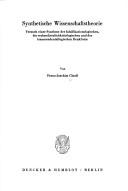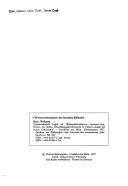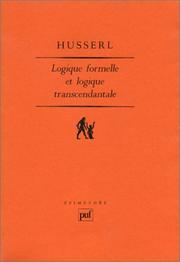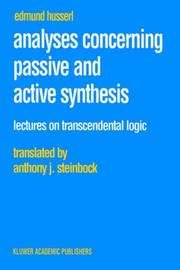| Listing 1 - 10 of 22 | << page >> |
Sort by
|
Book
Year: 1964 Publisher: München : Kösel-Verlag,
Abstract | Keywords | Export | Availability | Bookmark
 Loading...
Loading...Choose an application
- Reference Manager
- EndNote
- RefWorks (Direct export to RefWorks)
Book
ISBN: 2841371670 9782841371679 Year: 2004 Publisher: Grenoble: Millon,
Abstract | Keywords | Export | Availability | Bookmark
 Loading...
Loading...Choose an application
- Reference Manager
- EndNote
- RefWorks (Direct export to RefWorks)
Transcendental logic --- Phenomenology --- Logique transcendantale --- Phénoménologie --- Academic collection --- Phénoménologie
Book
ISSN: 04405927 ISBN: 9783787319732 3787319735 Year: 2010 Volume: 53 Publisher: Hamburg: Meiner,
Abstract | Keywords | Export | Availability | Bookmark
 Loading...
Loading...Choose an application
- Reference Manager
- EndNote
- RefWorks (Direct export to RefWorks)
Logic --- Hegel, Georg W.F. --- Contradiction --- Transcendental logic --- Logique --- Logique transcendantale --- Logic, Transcendental --- Transcendentalism --- Argumentation --- Deduction (Logic) --- Deductive logic --- Dialectic (Logic) --- Logic, Deductive --- Intellect --- Philosophy --- Psychology --- Science --- Reasoning --- Thought and thinking --- Dialetheism --- Paradox --- Methodology --- Contradiction. --- Logique. --- Logique transcendantale.
Book
ISBN: 9781137521743 Year: 2015 Publisher: Houndmills : Palgrave Macmillan,
Abstract | Keywords | Export | Availability | Bookmark
 Loading...
Loading...Choose an application
- Reference Manager
- EndNote
- RefWorks (Direct export to RefWorks)
This text examines the boundary between logic and philosophy in Kant and Hegel. Through a detailed analysis of 'quantity,' it highlights the different ways Kant and Hegel handle this boundary. Kant is consistent in maintaining this boundary, but Hegel erases it and in the process transforms both logic and philosophy.
Logic --- Transcendental logic --- Philosophy, German --- Logique --- Logique transcendantale --- Philosophie --- Kant, Immanuel, --- Hegel, Georg Wilhelm Friedrich, --- Critique et interprétation --- Kant, Immanuel --- Logique transcendantale. --- Philosophie. --- Hegel, Georg Wilhelm Friedrich --- Critique et interprétation.
Book

ISBN: 9782711618538 2711618536 2711618536 Year: 2007 Volume: *170 Publisher: Paris: Vrin,
Abstract | Keywords | Export | Availability | Bookmark
 Loading...
Loading...Choose an application
- Reference Manager
- EndNote
- RefWorks (Direct export to RefWorks)
Les Leçons sur la logique, données par Hegel dans l'été 1831, quelques mois avant sa mort, livrent son ultime pensée dans le domaine de cette science qui constitue l'" âme " du système. Le texte de l'Abrégé Encyclopédique n'est, comme il l'écrit à Cousin, " qu'une suite de thèses, dont le développement et l'éclaircissement est réservé aux cours ". On trouve donc, dans les rares manuscrits et cahiers de ses étudiants, le véritable écho de l'enseignement et des explications du maître, permettant de comprendre de nombreux paragraphes commentés par Hegel de manière nouvelle selon les années. Les notes de cours prises par Karl Hegel, son propre fils et son étudiant alors, fiables, complètes et homogènes, sont l'un des deux seuls témoignages des leçons faites sur la base de la dernière édition du manuel encyclopédique (1830). Leur intérêt est d'autant plus grand que ces leçons sont professées durant la période d'élaboration de la seconde édition de la Doctrine de l'Être de la Science de la Logique qui paraîtra en 1832. Elles bénéficient donc de cette proximité qui leur confère une clarté singulière due à la maturation profonde de la pensée hégélienne. Retrouvées et publiées récemment par des membres du Hegel-Archiv de Bochum, ces pages, traduites par les chercheurs du Centre Alpin de Philosophie Allemande (Université de Grenoble2 - ENS-LSH), constituent donc un outil indispensable à la compréhension de la Logique que Hegel a enseignée tous les ans, de 1818 à sa mort.
Logic --- Philosophy - Reference books --- Logique --- Logique transcendantale --- Concept --- Idée (philosophie) --- Catégories (philosophie) --- Raison --- Philosophie --- Philosophie allemande --- Philosophy

ISBN: 3428047192 Year: 1980 Volume: Bd. 60 Publisher: Berlin : Duncker & Humblot,
Abstract | Keywords | Export | Availability | Bookmark
 Loading...
Loading...Choose an application
- Reference Manager
- EndNote
- RefWorks (Direct export to RefWorks)
Science --- Refutation (Logic) --- Transcendental logic --- Probabilities --- Sciences --- Réfutation (Logique) --- Logique transcendantale --- Probabilités --- Philosophy --- Philosophie --- Réfutation (Logique) --- Probabilités --- Probabilities.
Book
Year: 1957 Publisher: Paris : Presses universitaires de France,
Abstract | Keywords | Export | Availability | Bookmark
 Loading...
Loading...Choose an application
- Reference Manager
- EndNote
- RefWorks (Direct export to RefWorks)
Transcendental logic --- Ontology --- Knowledge, Theory of --- Phenomenology --- Logique transcendantale --- Ontologie --- Théorie de la connaissance --- Phénoménologie

ISBN: 3465012062 Year: 1977 Volume: 32 Publisher: Frankfurt am Main : Klostermann,
Abstract | Keywords | Export | Availability | Bookmark
 Loading...
Loading...Choose an application
- Reference Manager
- EndNote
- RefWorks (Direct export to RefWorks)
Marburg school of philosophy --- Transcendental logic --- Neo-kantianism --- Ecole de Marburg --- Logique transcendantale --- Néo-kantisme --- Cohen, Hermann,

ISBN: 2130377629 Year: 1984 Publisher: Paris Presses universitaires de France
Abstract | Keywords | Export | Availability | Bookmark
 Loading...
Loading...Choose an application
- Reference Manager
- EndNote
- RefWorks (Direct export to RefWorks)
Logic --- Transcendental logic --- Ontology --- Knowledge, Theory of --- Phenomenology --- Logique --- Logique transcendantale --- Ontologie --- Théorie de la connaissance --- Phénoménologie --- Theory of knowledge

ISBN: 0792370651 079237066X 9401008469 9780792370659 Year: 2001 Volume: 9 Publisher: Dordrecht: Kluwer Academic Publishers,
Abstract | Keywords | Export | Availability | Bookmark
 Loading...
Loading...Choose an application
- Reference Manager
- EndNote
- RefWorks (Direct export to RefWorks)
Coming from what is arguably the most productive period of Husserl's life, this volume offers the reader a first translation into English of Husserl's renowned lectures on `passive synthesis', given between 1920 and 1926. These lectures are the first extensive application of Husserl's newly developed genetic phenomenology to perceptual experience and to the way in which it is connected to judgments and cognition. They include an historical reflection on the crisis of contemporary thought and human spirit, provide an archaeology of experience by questioning back into sedimented layers of meaning, and sketch the genealogy of judgment in `active synthesis'. Drawing upon everyday events and personal experiences, the Analyses are marked by a patient attention to the subtle emergence of sense in our lives. By advancing a phenomenology of association that treats such phenomena as bodily kinaesthesis, temporal genesis, habit, affection, attention, motivation, and the unconscious, Husserl explores the cognitive dimensions of the body in its affectively significant surroundings. An elaboration of these diverse modes of evidence and their modalizations (transcendental aesthetic), allows Husserl to trace the origin of truth up to judicative achievements (transcendental logic). Joined by several of Husserl's essays on static and genetic method, the Analyses afford a richness of description unequalled by the majority of Husserl's works available to English readers. Students of phenomenology and of Husserl's thought will find this an indispensable work.
Logic --- Logique transcendantale --- Transcendental logic --- Transcendentale logica --- Transcendental logic. --- Logic, Transcendental --- Transcendentalism --- Phenomenology . --- Modern philosophy. --- Epistemology. --- Phenomenology. --- Modern Philosophy. --- Epistemology --- Theory of knowledge --- Philosophy --- Psychology --- Modern philosophy --- Philosophy, Modern --- Knowledge, Theory of.
| Listing 1 - 10 of 22 | << page >> |
Sort by
|

 Search
Search Feedback
Feedback About UniCat
About UniCat  Help
Help News
News